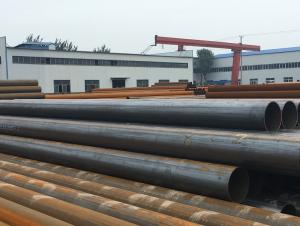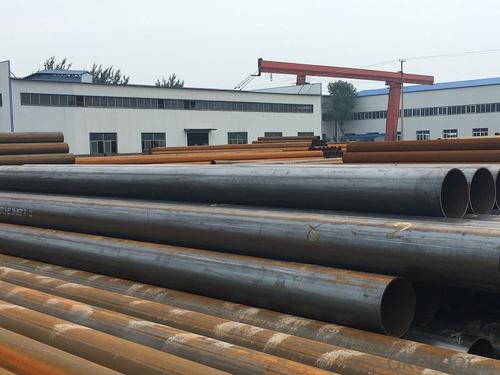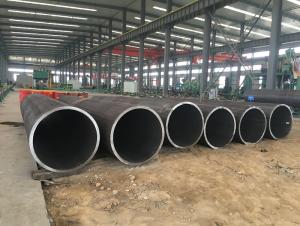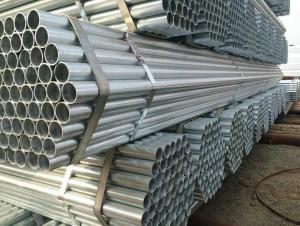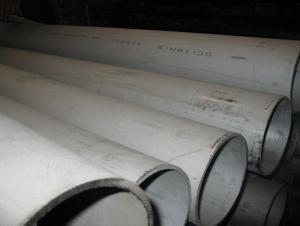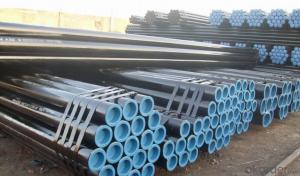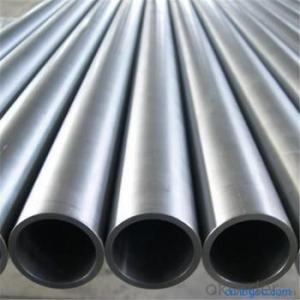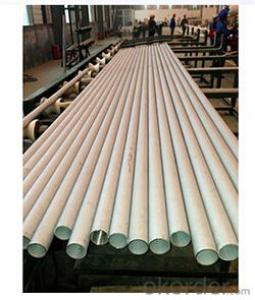Seamless Steel Pipe for high pressure fluids
- Loading Port:
- Tianjin
- Payment Terms:
- TT or LC
- Min Order Qty:
- 15 m.t.
- Supply Capability:
- 16000 m.t./month
OKorder Service Pledge
OKorder Financial Service
You Might Also Like
1、Structure of Seamless Steel Pipe for high pressure fluids
Seamless pipe is formed by drawing a solid billet over a piercing rod to create the hollow shell. As the manufacturing process does not include any welding, seamless pipes are perceived to be stronger and more reliable. Historically seamless pipe was regarded as withstanding pressure better than other types, and was often more easily available than welded pipe.
2、Main Features of Seamless Steel Pipe for high pressure fluids
• High manufacturing accuracy
• High strength
• Small inertia resistance
• Strong heat dissipation ability
• Good visual effect
• Reasonable price
3、Seamless Steel Pipe for high pressure fluids Specification:
Standard | GB, DIN, ASTM ASTM A106-2006, ASTM A53-2007 |
Grade | 10#-45#, 16Mn 10#, 20#, 45#, 16Mn |
Thickness | 8 - 33 mm |
Section Shape | Round |
Outer Diameter | 133 - 219 mm |
Place of Origin | Shandong, China (Mainland) |
Secondary Or Not | Non-secondary |
Application | Hydraulic Pipe |
Technique | Cold Drawn |
Certification | API |
Surface Treatment | factory state or painted black |
Special Pipe | API Pipe |
Alloy Or Not | Non-alloy |
Length | 5-12M |
Outer Diameter | 21.3-610mm |
Grade | 20#, 45#, Q345, API J55, API K55, API L80, API N80, API P110, A53B |
Standard | ASME, ASTM |
1) Material:20#(ASTM A 106/A53 GRB.API5LGRB,GB),45#,16Mn,10#.
2) Specification range:OD:21.3-610mm,WT:6-70mm,length:6-12m or according to the requirement of clients.
3) Excutive standards:GB,ASME API5L.ASTM A 106/A53,Despite of the above standards,we can also supply seamless steel pipe with standard of DIN,JIS,and so on,and also develop new products according to the requirements of our clients!
4) Surface:black lacquered,varnish coating or galvanized.
5) Ends:Beveled or square cut,plastic capped,painted.
6) Packing:bundles wrapped with strong steel strip,seaworthy packing.
4、Packaging & Delivery
Packaging Details: | seaworthy package,bundles wrapped with strong steel strip |
Delivery Detail: | 15-30days after received 30%TT |
5、FAQ of Seamless Steel Pipe for high pressure fluids
①How is the quality of your products?
Our products are manufactured strictly according to national and internaional standard, and we take a test
on every pipe before delivered out. If you want see our quality certifications and all kinds of testing report, please just ask us for it.
Guaranteed: If products’ quality don’t accord to discription as we give or the promise before you place order, we promise 100% refund.
Why should you chose us?
Chose happens because of quality, then price, We can give you both.Additionally, we can also offer professional products inquiry, products knowledge train(for agents), smooth goods delivery, exellent customer solution proposals.Our service formula: good quality+good price+good service=customer’s trust
SGS test is available, customer inspection before shipping is welcome, third party inspection is no problem.
6、Seamless Steel Pipe for high pressure fluids Images:
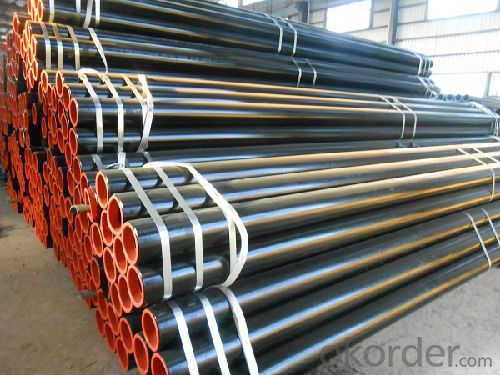
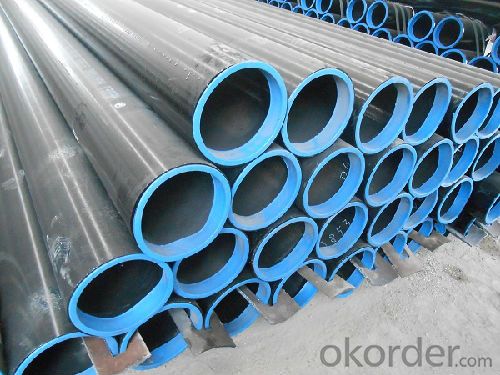
- Q: What is the role of steel pipes in the telecommunications industry?
- Steel pipes play a crucial role in the telecommunications industry as they are used for the installation of underground and overhead telecommunication cables. These pipes provide protection and support to the cables, ensuring their safety and longevity. Additionally, steel pipes are also used in the construction of communication towers and infrastructure, making them an essential component in establishing and maintaining reliable telecommunications networks.
- Q: Will the steel tube dance?
- In a single pole dance performance, the dancer moves more naturally, herself, moves and techniques, and does what she wants to do, while the style of dance is determined by herself, no one intervenes, and quite free.
- Q: What are the common applications of galvanized steel pipes?
- Galvanized steel pipes are commonly used in various industries and applications such as plumbing, water supply systems, gas pipelines, electrical conduits, construction projects, fencing, and outdoor structures. The galvanization process adds a protective zinc coating to the steel, making it resistant to corrosion and extending its lifespan, making it ideal for applications requiring durability and longevity.
- Q: What are the different end types for steel pipes?
- Steel pipes can have various end types, each designed for a specific purpose. Some common end types include: 1. Plain End: This is the simplest type, with no threading or special treatment. It is used for non-threaded applications or when welding is required. 2. Threaded End: These ends have male threads on one or both sides, allowing for easy connection with other threaded fittings or pipes. They are commonly used in plumbing and gas applications that require easy assembly and disassembly. 3. Beveled End: Beveled ends are cut at an angle (usually 30 or 45 degrees) to facilitate welding. The smooth transition between the pipe and the weld joint ensures a strong connection. They are used in construction, oil and gas, and pipeline industries. 4. Coupling End: These ends have female threads on both sides, enabling the joining of two pipes with a coupling or fitting. They are often used in plumbing systems or for easily disassembling pipe sections. 5. Flanged End: Flanged ends have a flared or raised lip on one or both sides, allowing for easy attachment to other flanged components like valves or pumps. They are commonly used in industrial applications requiring secure connections. 6. Socket Weld End: These ends have a socket or recess on one or both sides, allowing for easy connection with socket weld fittings. They provide a strong joint and are commonly used in high-pressure applications, such as petrochemical or power plants. These examples demonstrate the variety of end types available for steel pipes. The choice depends on specific application requirements, including the need for easy assembly, disassembly, or compatibility with other fittings.
- Q: How do steel pipes handle extreme weather conditions?
- Steel pipes are highly durable and can withstand extreme weather conditions. They have excellent resistance to corrosion, making them suitable for humid and coastal areas. Additionally, steel pipes can withstand high temperatures, making them reliable in extreme heat or cold. Their strength and resilience make them ideal for various applications, including oil and gas pipelines, water supply systems, and construction projects in harsh weather environments.
- Q: Are steel pipes recyclable?
- Yes, steel pipes are recyclable. Steel is a highly recyclable material and can be melted down and repurposed into new steel products, including pipes. Recycling steel pipes helps conserve natural resources and reduces the need for new steel production.
- Q: Steel pipe is particularly long, how to clean the inner wall of the pipe so that it can be thoroughly cleaned
- If the pipe is relatively long, you have water, you can buy ultrasonic vibration plate into the water for ultrasonic cleaning, if not too long with an ultrasonic vibration rod, inserted into the pipe cleaning, and then rinse with water by ultrasonic stripping of dirt, give you recommend a factory in Jining Hengda
- Q: What is the cost of steel pipes compared to other piping materials?
- The cost of steel pipes compared to other piping materials can vary depending on factors such as the size, grade, and specifications of the pipes, as well as market conditions and location. In general, steel pipes tend to be more expensive than some alternative piping materials such as PVC (polyvinyl chloride) or HDPE (high-density polyethylene). However, when compared to other materials like copper or stainless steel, steel pipes can often be more cost-effective. Steel pipes are known for their durability, strength, and resistance to high pressures and temperatures, making them suitable for various applications such as oil and gas pipelines, plumbing systems, and structural supports. Their longevity and reliability can offset the initial higher cost, as they often require less maintenance and have a longer lifespan than other materials. Additionally, steel pipes are readily available in different sizes and grades, making them versatile and adaptable to different project requirements. This availability and versatility can contribute to their cost-effectiveness, as they can be easily sourced and customized to specific needs. It's important to note that prices for steel pipes can fluctuate due to market conditions and factors such as raw material costs, transportation expenses, and labor charges. Therefore, it is advisable to consult with suppliers or industry experts to get accurate pricing information for steel pipes based on specific project specifications and market conditions.
- Q: What are the different types of steel pipe coatings for corrosion protection?
- Some of the different types of steel pipe coatings for corrosion protection include epoxy coatings, polyethylene coatings, polyurethane coatings, and zinc coatings.
- Q: How are steel pipes joined together?
- Steel pipes are often joined together using different methods such as welding, threading, and couplings. Welding involves melting the pipe ends and fusing them together, creating a strong and seamless joint. Threading involves cutting threads on the pipe ends and using fittings to screw them together. Couplings are used to connect two pipes by sliding them over the ends and tightening them with bolts or screws.
Send your message to us
Seamless Steel Pipe for high pressure fluids
- Loading Port:
- Tianjin
- Payment Terms:
- TT or LC
- Min Order Qty:
- 15 m.t.
- Supply Capability:
- 16000 m.t./month
OKorder Service Pledge
OKorder Financial Service
Similar products
Hot products
Hot Searches
Related keywords
